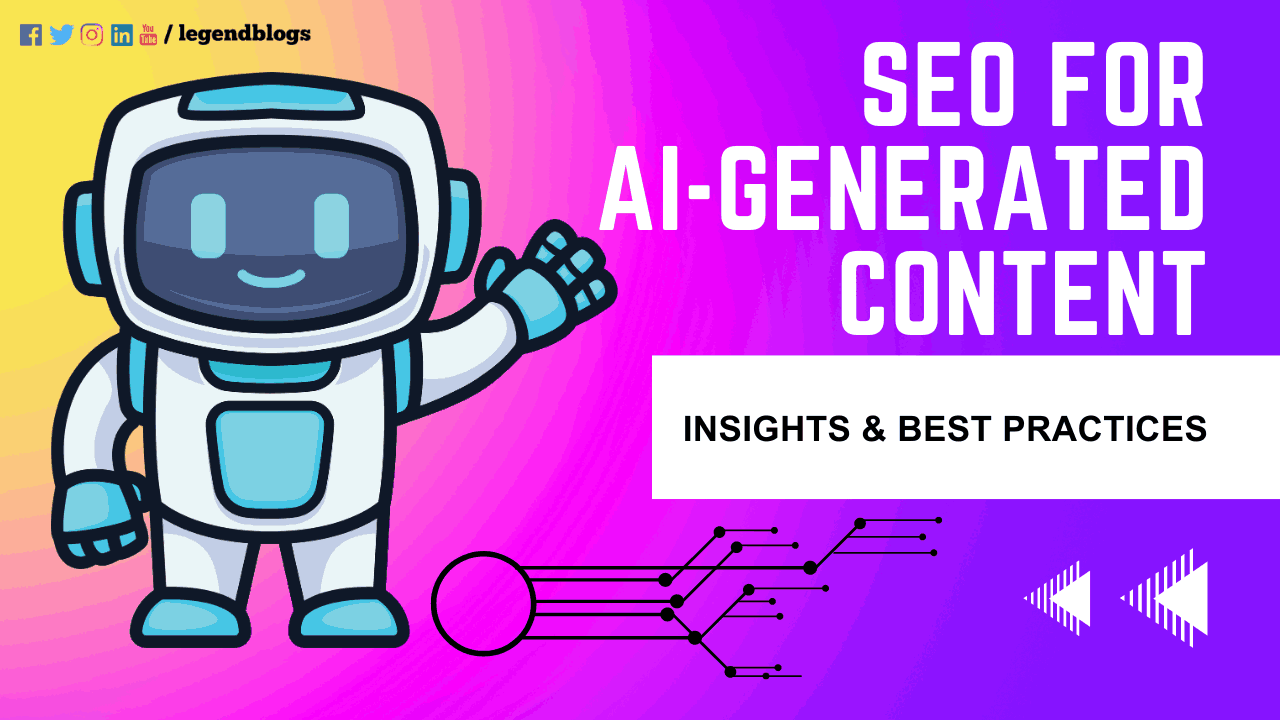In the digital age, the marriage of artificial intelligence (AI) and content creation has revolutionized the way businesses approach their online presence. AI-generated content, powered by algorithms and machine learning, offers unprecedented efficiency and scalability in content production.
However, to ensure this content is discoverable and ranks effectively in search engine results, it's essential to implement robust SEO strategies. In this blog post, we'll delve into Google's guidance on optimizing AI-generated content for search and explore best practices to enhance your SEO efforts.
Introduction
AI-generated content refers to text, images, or other media created with the assistance of artificial intelligence technologies. This can include automated writing tools, content generation platforms, and AI-driven content creation software. With the proliferation of AI, businesses are increasingly turning to these tools to streamline content creation processes and meet the growing demand for digital content.
SEO (Search Engine Optimization) plays a crucial role in ensuring that AI-generated content receives visibility and ranks prominently in search engine results pages (SERPs). Google, the dominant search engine, provides valuable insights and guidelines for optimizing AI-generated content to align with its search algorithms.
Understanding SEO for AI-Generated Content
SEO for AI-generated content encompasses a set of strategies and techniques aimed at improving its visibility and ranking in search engine results. While the fundamentals of SEO remain consistent, there are unique considerations when optimizing AI-generated content:
- Natural Language and Human Readability: Despite being generated by machines, AI content should maintain natural language flow and readability to resonate with human audiences.
- Content Relevance and Quality: Focus on producing high-quality, relevant content that addresses users' search intent and provides value.
- Strategic Keyword Usage: Incorporate focus keywords strategically within the content to signal its relevance to search engines without compromising readability.
- Structuring for SEO: Organize content into well-defined sections with clear headings, subheadings, and bullet points to improve readability and SEO.
Best Practices for Optimizing AI-Generated Content
To optimize AI-generated content effectively for SEO, consider the following best practices:
- Utilize Natural Language Generation (NLG) Platforms: Leverage NLG platforms that generate human-like content to ensure readability and authenticity.
- Keyword Research and Optimization: Conduct thorough keyword research to identify relevant keywords and incorporate them naturally into the content.
- Regular Content Audits: Continuously monitor and audit AI-generated content to ensure it aligns with SEO best practices and remains relevant to target audiences.
- Optimize Metadata: Write compelling titles, meta descriptions, and alt text for images to enhance the visibility of AI-generated content in search results.
- Monitor Performance: Use analytics tools to track the performance of AI-generated content, including its ranking, click-through rate (CTR), and engagement metrics.
Google's Guidance on SEO for AI-Generated Content
Google provides guidance on optimizing AI-generated content to ensure compliance with its search algorithms and guidelines:
- Originality and Duplication: Avoid duplicating content generated by AI across multiple pages or websites. Ensure each piece of content offers unique value to users.
- Transparency and Disclosure: Clearly disclose if content is generated by AI to maintain transparency with users. Google emphasizes the importance of transparency in content creation processes.
Comparisons: Traditional Content vs. AI-Generated Content
| Aspect | Traditional Content | AI-Generated Content |
|---|---|---|
| Production Time | Time-consuming, manual process | Rapid production, automated by AI algorithms |
| Content Quality | Highly dependent on human expertise | Consistency in quality, potential for algorithmic errors |
| Scalability | Limited scalability due to manual efforts | Highly scalable, capable of generating large volumes of content |
| SEO Optimization | Requires manual SEO optimization efforts | Can be optimized using AI-driven SEO tools and strategies |
Examples of Successful SEO Optimization for AI-Generated Content
One notable example of successful SEO optimization for AI-generated content is the use of NLG platforms by e-commerce companies to generate product descriptions. By incorporating relevant keywords and ensuring readability, these companies have seen improvements in search rankings and organic traffic.
Pros and Cons of Optimizing AI-Generated Content for SEO
Pros:
Efficiency and Scalability:
AI-generated content offers unparalleled efficiency and scalability, enabling businesses to produce large volumes of content quickly.
With automation, tasks that would traditionally require hours or days can now be completed in minutes, allowing companies to stay ahead of content demands.
This efficiency saves time and resources, freeing up human creators to focus on higher-value tasks such as strategy and creativity.
Consistency in Content Quality:
AI algorithms maintain a consistent level of quality across content production, reducing the risk of human error and inconsistency.
Unlike human creators who may vary in skill and attention to detail, AI systems follow predetermined rules and guidelines, ensuring uniformity in tone, style, and accuracy.
Consistent content quality contributes to brand reputation and fosters trust among consumers, leading to increased loyalty and engagement.
Enhanced Optimization Potential:
AI-driven tools and algorithms have the potential to enhance SEO optimization efforts by analyzing vast amounts of data and user behavior patterns.
By identifying trends, keywords, and optimization opportunities that may be overlooked by humans, AI can improve targeting, visibility, and rankings in search engine results pages (SERPs).
This data-driven approach maximizes the effectiveness of SEO strategies, resulting in increased organic traffic and improved online visibility.
Cons:
Risk of Lower Content Quality:
Despite advancements in AI technology, there remains a risk of lower content quality, particularly in nuanced or complex topics.
AI-generated content may lack the creativity, emotional intelligence, and critical thinking abilities that humans possess, resulting in shallow or inaccurately portrayed information.
Content quality issues can undermine credibility, damage brand reputation, and diminish user trust, ultimately impacting engagement and conversions.
Challenges in Maintaining Authenticity:
AI-generated content may struggle to convey authenticity and sincerity, leading to a disconnect with audiences.
Consumers increasingly value authentic, human-centered experiences, and content that feels robotic or insincere may fail to resonate.
Maintaining authenticity becomes crucial, as overly automated content runs the risk of alienating audiences and diluting brand identity, ultimately leading to decreased engagement and loyalty.
Potential for Algorithmic Errors:
AI algorithms are not infallible and may produce errors or inaccuracies, particularly when dealing with ambiguous or complex input data.
These algorithmic errors can manifest as grammatical mistakes, factual inaccuracies, or misinterpretations of user intent, undermining the credibility and reliability of the content.
Such errors not only compromise the quality of content but also impact its SEO performance, leading to decreased visibility and credibility in search results.
FAQs (Frequently Asked Questions)
What is AI-generated content?
AI-generated content refers to text, images, or other media created with the assistance of artificial intelligence technologies.
Is AI-generated content effective for SEO?
Yes, AI-generated content can be optimized for SEO to improve its visibility and ranking in search engine results.
How does Google perceive AI-generated content?
Google encourages transparency and disclosure regarding AI-generated content and emphasizes the importance of originality and relevance.
What are the risks associated with using AI-generated content for SEO?
Risks include lower content quality, challenges in maintaining authenticity, and potential algorithmic errors impacting SEO performance.
How can I ensure compliance with Google's guidelines when optimizing AI-generated content for SEO?
Ensure content is original, relevant, and transparently disclosed as AI-generated. Regularly monitor and audit content to align with Google's guidelines.
Conclusion
In conclusion, optimizing AI-generated content for SEO requires a strategic approach that balances efficiency with quality and authenticity. By following Google's guidance and implementing best practices, businesses can maximize the visibility and effectiveness of AI-generated content in search engine results.
Have questions or insights to share about SEO for AI-generated content? Feel free to leave a comment below!





Write a comment